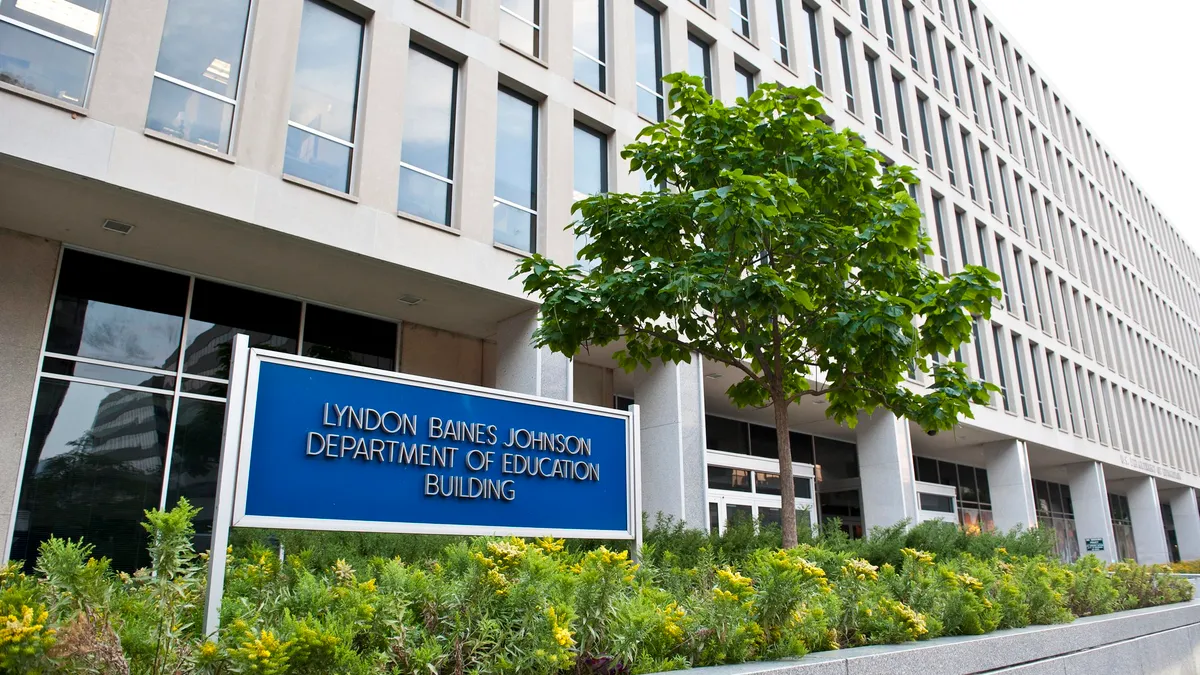Dive Brief:
- International Education Corp., a for-profit college owner, agreed to oust two top executives to settle matters related to alleged violations of regulations that allow students without high school diplomas or GEDs to receive federal financial aid, according to a Thursday announcement from the U.S. Department of Education.
- IEC must provide proof within 60 days of the settlement agreement that it no longer employs Fardad Fateri, IEC’s chief executive, and Sanjay Sardana, its chief financial officer, according to the deal. The Education Department said Thursday that the duo led the company during “the widespread wrongdoing.”
- The settlement comes after the Education Department pulled Title IV federal financial aid access from IEC's Florida Career College, which recently announced plans to shut down by mid-February. The agency accused FCC officials of violating the rules around ability-to-benefit testing, which measures if students who didn't finish high school or the equivalent would benefit from a college education.
Dive Insight:
Last year, the Education Department accused FCC of widespread violations of ability-to-benefit testing. The agency said FCC officials violated testing rules by changing students’ answers after they submitted their tests, allowing them to use calculators, and helping them with the exam or taking it for them altogether.
FCC enrolled a large share of students through ability-to-benefit testing — up to 48% of the college’s students were admitted through this process since 2018. In response, the Education Department announced plans to strip the college of Title IV funding — a move that proved to be a fatal blow.
Title IV funding accounted for around 87% of FCC’s revenue in fiscal year 2021, amounting to about $86 million, according to federal data.
The Education Department had also opened an investigation into other IEC-owned institutions, United Education Institute and UEI College, over potential ability-to-benefit violations.
The settlement will end that investigation, though it requires the institutions to stop enrolling students with federal financial aid through ability-to-benefit testing for three years. The deal also finalizes the Education Department’s decision to cut off federal financial aid access to FCC.
“IEC vigorously contested the claims made against it but appreciates its partners at the US Department of Education for reviewing the school’s evidence and engaging in the productive dialogue that culminated in the resolution announced today,” IEC spokesperson Joseph Cockrell said in a Thursday statement. “This outcome allows us to continue our crucial mission serving students, student employers, and our campus communities throughout the United States.”
Around one-third of United Education Institute and UEI College students who receive Title IV aid qualified for those funds because they passed an ability-to-benefit exam, according to the settlement agreement.
However, Cockrell noted that IEC halted ability-to-benefit testing across its institutions after the Education Department took action last year.
The removal of the top executives will allow United Education Institute to retain access to Title IV funding, according to the Education Department. Cockrell said via email that a transition plan is in development.
United Education Institute and UEI College must also preserve its recruiting and marketing materials for Education Department monitoring.
Additionally, the company also must provide a roughly $6 million letter of credit, a type of financial collateral that the Education Department could use to pay for loan discharges stemming from the alleged violations.
“This strong agreement with International Education Corporation demonstrates Federal Student Aid’s commitment to holding schools and individuals accountable for abiding by the laws and regulations that govern the federal student aid programs,” FSA Chief Operating Officer Richard Cordray said in a statement. “Our Enforcement Office will continue to investigate reports of wrongdoing by schools and individuals to protect the integrity of our programs.”
IEC will neither admit to nor deny wrongdoing under the deal. The agreement also doesn’t prevent the Education Department from taking further actions against the company and its colleges.
The Education Department did not immediately answer questions Thursday about the deal.














